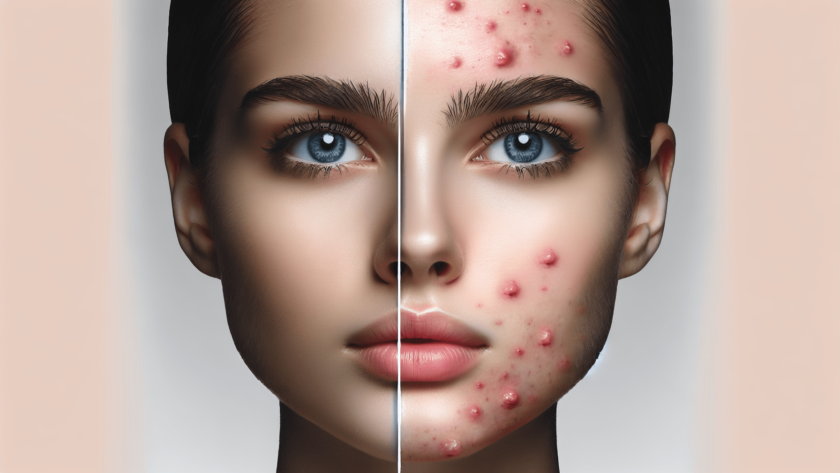Hey there! Have you ever wondered how stress can actually affect your skin? It turns out that high levels of stress can lead to skin issues like breakouts, dullness, and even premature aging. In this article, we’ll explore the connection between stress and skin health, and discover some tips on how to keep your skin looking its best even during the most stressful times. Let’s dive in and learn more about how stress impacts your skin! How Does Stress Impact My Skin?
Hey there! Have you ever wondered why your skin seems to act up more when you’re feeling stressed out? Well, you’re not alone. Stress can have a significant impact on your skin, causing everything from breakouts to dryness. In this article, we’ll explore how stress affects your skin and what you can do to minimize its effects.
The Connection Between Stress and Skin Health
When you’re stressed, your body releases hormones like cortisol and adrenaline, which can have a direct impact on your skin. These hormones can trigger inflammation, increase oil production, and disrupt the natural balance of your skin. As a result, you may experience issues like acne, eczema, psoriasis, and more.
Stress can also weaken your skin’s barrier function, making it more susceptible to environmental aggressors like pollution and UV rays. This can lead to premature aging, dryness, and sensitivity. In short, stress doesn’t just affect your mental health – it can also take a toll on your skin.
Common Skin Issues Caused by Stress
Let’s dive deeper into some of the most common skin issues that can be exacerbated by stress:
Acne
Stress can trigger acne breakouts by increasing sebum production and inflammation in the skin. When you’re stressed, your body goes into “fight or flight” mode, which can lead to hormonal imbalances and clogged pores. This, in turn, can result in pimples, blackheads, and whiteheads.
If you’re already prone to acne, stress can make the problem even worse. That’s why it’s essential to manage stress levels to keep your skin clear and healthy.
Eczema
Eczema is a chronic skin condition characterized by red, itchy patches on the skin. Stress can exacerbate eczema symptoms by weakening the skin barrier and triggering inflammation. This can lead to flare-ups and discomfort, making it essential to find ways to relax and manage stress to improve eczema symptoms.
Psoriasis
Psoriasis is another chronic skin condition that can be worsened by stress. The immune system response in psoriasis causes rapid skin cell growth, leading to thick, scaly patches on the skin. Stress can trigger psoriasis flare-ups and make the condition more challenging to manage. Finding ways to reduce stress can help keep psoriasis symptoms under control.
Premature Aging
Chronic stress can accelerate the aging process by causing oxidative stress and inflammation in the skin. This can lead to wrinkles, fine lines, and sagging skin. If you’re constantly stressed, your skin may appear dull, tired, and aged beyond your years. Managing stress is crucial for maintaining a youthful complexion and preventing premature aging.
How to Manage Stress for Better Skin Health
Now that you understand how stress can impact your skin, let’s explore some strategies for managing stress to improve your skin health:
Practice Self-Care
Self-care is essential for managing stress and improving your overall well-being. Take time each day to do something you enjoy, whether it’s reading a book, taking a warm bath, or going for a walk. Engaging in activities that make you happy can help reduce stress levels and promote healthier skin.
Exercise Regularly
Exercise is a fantastic way to relieve stress and improve your skin health. Physical activity releases endorphins, our body’s natural feel-good hormones, which can boost your mood and reduce stress. Regular exercise also improves circulation, which can help nourish your skin cells and promote a radiant complexion.
Get Enough Sleep
Sleep is crucial for overall health and skin repair. When you’re sleep-deprived, your body produces more cortisol, the stress hormone, which can wreak havoc on your skin. Aim for 7-9 hours of quality sleep each night to allow your skin to regenerate and repair itself. Establishing a bedtime routine and creating a relaxing sleep environment can help you get the rest you need for healthy skin.
Practice Mindfulness and Meditation
Mindfulness and meditation are powerful tools for managing stress and promoting skin health. These practices can help you stay present in the moment, reduce anxiety, and improve your overall sense of well-being. Taking just a few minutes each day to meditate can have a significant impact on your stress levels and skin health.
Maintain a Healthy Diet
Eating a nutritious diet rich in vitamins, minerals, and antioxidants is essential for healthy skin. Certain nutrients, like vitamin C, vitamin E, and omega-3 fatty acids, can help combat the effects of stress on your skin and promote a clear complexion. Avoiding processed foods, sugar, and excess caffeine can also help reduce inflammation and improve skin health.
Skincare Tips for Stressful Times
In addition to managing stress through lifestyle changes, you can also take care of your skin with the right skincare routine. Here are some skincare tips for stressful times:
Gentle Cleansing
When you’re stressed, your skin may be more sensitive and prone to irritation. Opt for a gentle cleanser that won’t strip your skin of its natural oils. Look for mild, non-comedogenic formulas that will effectively cleanse your skin without causing further damage.
Hydration
Stress can dehydrate your skin, leading to dryness and dullness. Make sure to stay hydrated by drinking plenty of water throughout the day. You can also use a hydrating moisturizer to lock in moisture and keep your skin plump and healthy.
Sun Protection
Protecting your skin from the sun is essential, especially when you’re stressed. UV rays can exacerbate skin issues and cause premature aging. Wear sunscreen with at least SPF 30 every day, even when it’s cloudy, to shield your skin from harmful UV radiation.
Relaxing Skincare Routine
Create a relaxing skincare routine to unwind at the end of a stressful day. Incorporate products with calming ingredients like lavender, chamomile, and green tea to soothe your skin and your mind. Take your time to massage your skincare products into your skin, enjoy the scents, and relax before bed.
Regular Exfoliation
Exfoliation can help remove dead skin cells and unclog pores, preventing breakouts and improving skin texture. However, be gentle with your skin when exfoliating, especially when you’re stressed. Over-exfoliation can damage the skin barrier and worsen skin issues. Use a mild exfoliator once or twice a week to maintain a healthy glow.
Conclusion
Stress can have a profound impact on your skin health, causing a range of issues from acne to premature aging. By understanding how stress affects your skin and implementing strategies to manage stress, you can improve your skin’s condition and overall well-being. Remember to practice self-care, exercise regularly, get enough sleep, and maintain a healthy diet to support your skin from the inside out. With the right lifestyle changes and skincare routine, you can minimize the effects of stress on your skin and achieve a clear, radiant complexion. Take care of yourself, and your skin will thank you for it!




